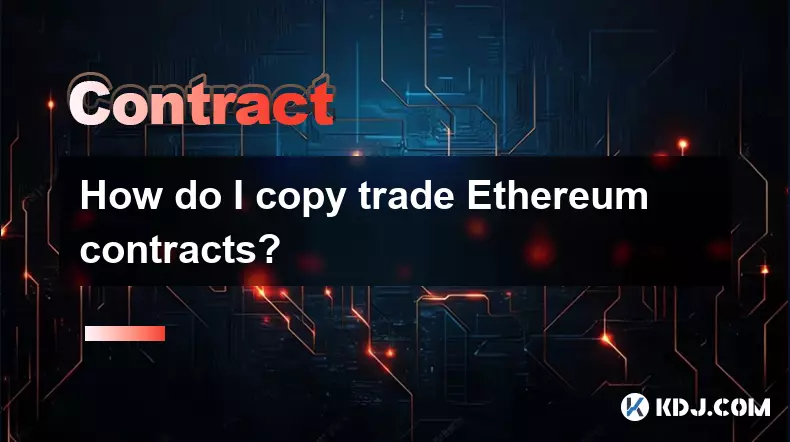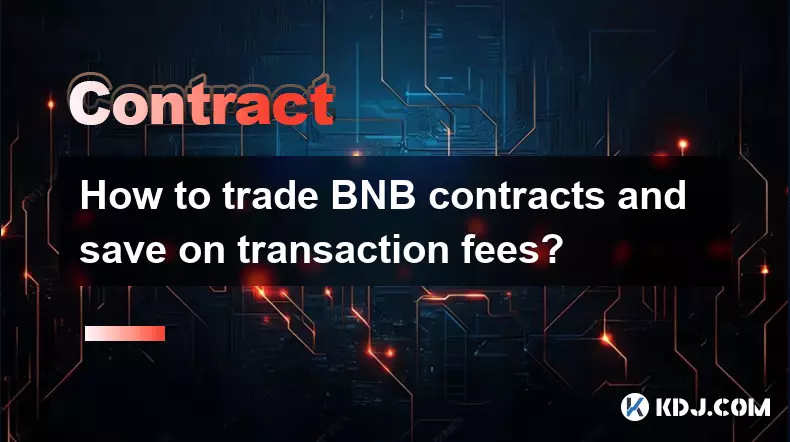-
 bitcoin
bitcoin $87959.907984 USD
1.34% -
 ethereum
ethereum $2920.497338 USD
3.04% -
 tether
tether $0.999775 USD
0.00% -
 xrp
xrp $2.237324 USD
8.12% -
 bnb
bnb $860.243768 USD
0.90% -
 solana
solana $138.089498 USD
5.43% -
 usd-coin
usd-coin $0.999807 USD
0.01% -
 tron
tron $0.272801 USD
-1.53% -
 dogecoin
dogecoin $0.150904 USD
2.96% -
 cardano
cardano $0.421635 USD
1.97% -
 hyperliquid
hyperliquid $32.152445 USD
2.23% -
 bitcoin-cash
bitcoin-cash $533.301069 USD
-1.94% -
 chainlink
chainlink $12.953417 USD
2.68% -
 unus-sed-leo
unus-sed-leo $9.535951 USD
0.73% -
 zcash
zcash $521.483386 USD
-2.87%
How do I copy trade Ethereum contracts?
Copy trading in Ethereum contracts lets beginners mirror experts’ moves, but verifying trader authenticity and managing risks like frontrunning are crucial for success.
Sep 24, 2025 at 06:37 am

Understanding Copy Trading in Ethereum Contracts
1. Copy trading within the Ethereum ecosystem involves replicating the actions of experienced traders in real time, particularly their interactions with smart contracts on the Ethereum blockchain. This method allows less experienced participants to benefit from proven strategies without needing deep technical knowledge. The process hinges on transparency and accessibility provided by decentralized networks.
2. Most copy trading platforms that support Ethereum-based contracts use wallet tracking mechanisms. These tools monitor specific wallet addresses known for successful contract interactions. When a signal trader executes a transaction—such as deploying a contract, swapping tokens via Uniswap, or interacting with yield farming protocols—followers’ wallets automatically replicate those moves based on predefined rules.
3. It is essential to verify the authenticity and performance history of the trader you intend to follow, as fraudulent actors often mimic successful wallets to lure inexperienced users. Blockchain analysis tools like Etherscan can help validate past transactions and ensure consistency in profitable behavior before initiating any automated replication.
Platforms Enabling Ethereum Contract Copy Trading
1. Several decentralized finance (DeFi) platforms now offer built-in copy trading features tailored for Ethereum smart contracts. Examples include Syklo, TokenMinds, and CopyTradeFi, which integrate directly with MetaMask and other Web3 wallets. These platforms allow users to subscribe to top-performing traders and mirror their contract executions across various DeFi protocols.
2. Subscription models vary—some charge a percentage of profits, while others require fixed fees paid in ETH or platform-specific tokens. Users must review fee structures carefully, as high costs can erode gains over time, especially during volatile market phases when frequent contract interactions occur.
3. Security remains a critical concern; only grant limited permissions using wallet providers that support granular access control, such as Rabby or Ledger Live, to prevent unauthorized fund transfers. Always revoke smart contract allowances after unsubscribing from a service to minimize exposure to potential exploits.
Setting Up Automated Contract Replication
1. To begin copying Ethereum contract trades, connect your wallet to a supported platform through WalletConnect or injected provider options. Confirm the connection on your hardware wallet if applicable, ensuring no sensitive data is exposed during the handshake process.
2. Browse available traders specializing in contract deployment, arbitrage, or flash loan utilization. Filter results by success rate, total volume handled, and risk score. Select one whose strategy aligns with your risk tolerance and investment goals.
3. Configure execution parameters such as slippage tolerance, gas limit adjustments, and trade size multipliers. For instance, if the leader invests 1 ETH in a liquidity pool creation, you might set your multiplier to 0.5x to allocate only 0.5 ETH per replicated action.
4. Enable real-time syncing so your wallet receives alerts or triggers whenever the followed address interacts with a new contract. Some systems use relayers to broadcast transactions instantly, minimizing latency between the original and copied trade.
Risks and Mitigation Strategies
1. One major risk in copying Ethereum contract trades is frontrunning, where bots detect pending transactions and exploit price discrepancies before your replicated trade confirms. This is especially prevalent in mempool-heavy periods, leading to reduced profitability or failed executions.
2. Another issue arises from incomplete understanding of the underlying contract logic. Blindly following a deployer’s move may expose you to malicious code or rug pulls disguised as legitimate projects. Always inspect contract source code on Etherscan or use verification services like Sourcify before engaging.
3. Diversifying across multiple signal providers reduces dependency on a single strategy and lowers systemic risk tied to sudden market shifts or protocol failures. Avoid concentrating funds on one follower account even if it has an impressive track record.
Frequently Asked Questions
Can I copy trade Ethereum contracts without holding ETH?No. All interactions on the Ethereum network require ETH to pay for gas fees. Even if you're replicating token deployments or swaps, you need ETH in your wallet to cover transaction costs.
Are there centralized platforms that support Ethereum contract copy trading?Yes, some hybrid platforms like Binance Earn and eToro Crypto offer limited copy trading features involving Ethereum assets, though they typically focus on spot positions rather than direct contract interactions. Full contract-level replication remains mostly decentralized.
How do I stop copying a trader’s contract actions?Access the platform where you subscribed, navigate to your active strategies, and unsubscribe from the trader’s profile. Afterward, use a tool like Revoke.cash to remove any remaining ERC-20 token allowances granted to associated contracts.
Is it possible to manually review each contract trade before copying?Yes, many platforms provide a “manual approval” mode. In this setting, you receive notifications for every proposed transaction and must confirm each one individually, offering greater control at the cost of speed.
Disclaimer:info@kdj.com
The information provided is not trading advice. kdj.com does not assume any responsibility for any investments made based on the information provided in this article. Cryptocurrencies are highly volatile and it is highly recommended that you invest with caution after thorough research!
If you believe that the content used on this website infringes your copyright, please contact us immediately (info@kdj.com) and we will delete it promptly.
- Bitcoin Under Pressure: Galaxy Analyst Eyes $58K Amidst ETF Outflows and Weakening Debasement Narrative
- 2026-02-03 19:00:02
- Crypto Market Stabilizes as Bitcoin Rebounds; Key Factors Driving the Recovery
- 2026-02-03 19:10:02
- ETH Rebound Ignites L3 Architecture Race: Liquid Chain Eyes the Fragmentation Fix
- 2026-02-03 19:10:02
- Halle Berry Unpacks Prom Queen Racism and Hollywood's Persistent Barriers
- 2026-02-03 19:40:02
- Epstein Files, Israel, and Bitcoin Network: Unpacking the Weekend's Crypto Turmoil and Lingering Control Claims
- 2026-02-03 19:40:02
- Elon Musk, SpaceX, Dogecoin: To the Moon and Beyond with AI-Powered Dreams
- 2026-02-03 19:35:01
Related knowledge

How to close a crypto contract position manually or automatically?
Feb 01,2026 at 11:19pm
Manual Position Closure Process1. Log into the trading platform where the contract is active and navigate to the 'Positions' or 'Open Orders' tab. 2. ...

How to understand the impact of Bitcoin ETFs on crypto contracts?
Feb 01,2026 at 04:19pm
Bitcoin ETFs and Market Liquidity1. Bitcoin ETFs introduce institutional capital directly into the spot market, increasing order book depth and reduci...

How to trade DeFi contracts during the current liquidity surge?
Feb 01,2026 at 07:00am
Understanding Liquidity Dynamics in DeFi Protocols1. Liquidity surges in DeFi are often triggered by coordinated capital inflows from yield farming in...

How to use social trading to copy crypto contract experts?
Feb 02,2026 at 07:40am
Understanding Social Trading Platforms1. Social trading platforms integrate real-time market data with user interaction features, enabling traders to ...

How to trade BNB contracts and save on transaction fees?
Feb 03,2026 at 12:39am
Understanding BNB Contract Trading Mechanics1. BNB contracts are derivative instruments traded on Binance Futures, allowing users to gain leveraged ex...

How to build a consistent crypto contract trading plan for 2026?
Feb 02,2026 at 10:59pm
Defining Contract Specifications1. Selecting the underlying asset requires evaluating liquidity depth, historical volatility, and exchange support acr...

How to close a crypto contract position manually or automatically?
Feb 01,2026 at 11:19pm
Manual Position Closure Process1. Log into the trading platform where the contract is active and navigate to the 'Positions' or 'Open Orders' tab. 2. ...

How to understand the impact of Bitcoin ETFs on crypto contracts?
Feb 01,2026 at 04:19pm
Bitcoin ETFs and Market Liquidity1. Bitcoin ETFs introduce institutional capital directly into the spot market, increasing order book depth and reduci...

How to trade DeFi contracts during the current liquidity surge?
Feb 01,2026 at 07:00am
Understanding Liquidity Dynamics in DeFi Protocols1. Liquidity surges in DeFi are often triggered by coordinated capital inflows from yield farming in...

How to use social trading to copy crypto contract experts?
Feb 02,2026 at 07:40am
Understanding Social Trading Platforms1. Social trading platforms integrate real-time market data with user interaction features, enabling traders to ...

How to trade BNB contracts and save on transaction fees?
Feb 03,2026 at 12:39am
Understanding BNB Contract Trading Mechanics1. BNB contracts are derivative instruments traded on Binance Futures, allowing users to gain leveraged ex...

How to build a consistent crypto contract trading plan for 2026?
Feb 02,2026 at 10:59pm
Defining Contract Specifications1. Selecting the underlying asset requires evaluating liquidity depth, historical volatility, and exchange support acr...
See all articles

























![Discontinuum by: ArchitechGD 100% (1 coin) (Mobile) Geometry Dash [2.2] Discontinuum by: ArchitechGD 100% (1 coin) (Mobile) Geometry Dash [2.2]](/uploads/2026/02/03/cryptocurrencies-news/videos/origin_69814d99e6b61_image_500_375.webp)
















































